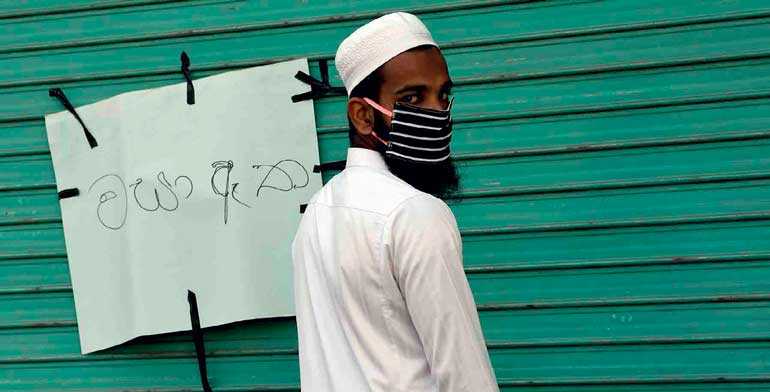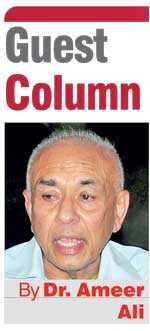Tuesday Feb 24, 2026
Tuesday Feb 24, 2026
Tuesday, 7 April 2020 01:01 - - {{hitsCtrl.values.hits}}

At a time when Muslim organisations, activists and civil societies are bending backwards to help GR in his efforts to free the country of the deadly virus, incriminating and demonising the whole community seems to cover a more dangerous and sinister plan. There is already ample documentary evidence showing a systematic growth of Muslim phobia at least since 2009. This phobia appears to have reached its climax in the current environment. Why? – Pic by Shehan Gunasekara
All countries are compelled to implement draconian measures to curtail people’s liberties and impose punishment to lawbreakers in the fight against COVID-19. Sri Lanka cannot be an exception to this norm. People are indeed living in unprecedented times and they have to put up with unprecedented restrictions in the interest of greater good. One should give credit to President GR for taking some decisive steps albeit a little late in combating the spread of the deadly virus.
It is a twin crises that the world is confronted with at the moment: people’s life on the one hand and their livelihood on the other. It is health and economic crises occurring simultaneously and with equal ferocity. These need to be tackled with an incredible amount of foresight and planning about the future when COVID-19 disappears, recovery begins and normalcy returns. 
It is regarding the preparations for that economic recovery and conditions of expected normalcy that one is forced to raise few concerns about developments that are currently taking place under the GR-MR duumvirate. Between GR and MR, Generalissimo GR seems to have taken the upper hand.
Sri Lanka being a medium-size and open economy is extremely vulnerable to external shocks. Direct foreign investment, tourism, foreign remittances and an undisrupted global supply chain are part of the lifeblood of its economy. Obviously, disruption in one or more of these ingredients would inevitably cause economic slowdown, recession and in the extreme, even depression.
Economic difficulties compounded
The new coronavirus has impacted all those ingredients and without a complementary domestic sector to fill in the gaps, at least in the provision of basic needs, the country’s economic difficulties have compounded. Further borrowing from foreign sources, at least to sustain a modicum of living standard to millions of people, is unavoidable. The economy’s immediate future does not look promising at all.
In the meantime, the country is virtually ruled by the army and police forces under the command of GR. Frequent and prolonged curfews have crippled human movement and shut down commercial, business and administrative establishments.
Millions of daily wage earners have been deprived of work, and their misery and associated social problems are bound to create more headache to the regime. Small and medium size distributive establishments will have no alternative but to downsize their workforce and operation. Farmers cannot attend to their farms because of the curfew, and other small industrial establishments also facing the same difficulty.
Given this scenario it will be advisable for policymakers to be selective in their restrictions and even assist with whatever means those productive sectors to keep the economic wheel turning so that when recovery begins those sectors would regain their previous momentum with little difficulty. Preventing the spread of the virus and planning for economic recovery must go hand in hand, and it is needless to stress that both require full cooperation of all sections of the society. How to elicit that cooperation is a question that regrettably eludes the attention of GR and his advisors.
Post-coronavirus economy
In any case, the post-coronavirus economy has to be structurally different from the one prior to it. This applies not only to Sri Lanka but also many other countries that were lured by the free market neo-liberal philosophy and induced to sacrifice some of their vital economic pursuits, which provided livelihood to millions of domestic workers.
These countries narrowed their own production base and enabled China to become the workshop of the world. Today, they are caught totally unprepared for a disaster like COVID-19 that crippled the entire supply chain and deprived people of even some basic necessities.
Here is a lesson to learn. Turbo capitalism and globalisation have failed, and once recovery begins, Sri Lanka should prepare itself to become a net producer instead of being a net distributor and consumer. To make this transformation, at least a limited revival of the import substitution strategy introduced under Sirimavo Bandaranaike’s leftist coalition and prematurely discontinued by JR, should receive serious consideration.
Politics in implementation of restrictions
There is also another worrying issue regarding the implementation of restrictions. Politics seems to play a hidden role in this.
Overt discrimination by the Army, Police and other authorities when dealing with different ethnic and religious communities has come to light. Reports from multiple sources indicate that the Muslim community in particular has come under stringent scrutiny by security forces, as if that community was the chief culprit in spreading the virus.
There is no denying the fact that some Muslim fanatics with shallow knowledge of their faith blindly put all reliance on God and pay no heed to Government rules and regulations. Such groups and individuals must be identified and made accountable for their disobedience. However, authorities should not incriminate an entire community for the recalcitrance of a few. Within the governing rules and regulations sufficient tolerance should be extended to every community in respect of each community’s religious and cultural traditions and susceptibilities.
The cremation of Muslims who died of new coronavirus is one issue that is causing tremendous discomfort to the Muslim community. In Australia for example, dead bodies are put in a bag and taken straight to the burial ground allowing a maximum of 10 people to attend to funeral rites. If burial is permitted in one country, why cannot it be allowed in another? Even Amnesty International has raised its concern about Sri Lanka’s insensitivity in this matter.
More convincing argument than the one-law-one-justice contention is required. In fact, that contention is the modified version of the ‘one-country-one-law’ argument put forward by Ven. Athuraliye Rathana Thera, a maverick Buddhist monk. This monk’s anti-Muslim agenda is public knowledge.
What is more is the role of the Sinhala commercial media in promoting this type of Muslim phobia. However, what is shocking in this saga, as in several previous occasions, is the strategic silence of GR and his refusal to intervene. His silence feeds hatemongers’ propaganda.
At a time when Muslim organisations, activists and civil societies are bending backwards to help GR in his efforts to free the country of the deadly virus, incriminating and demonising the whole community seems to cover a more dangerous and sinister plan. There is already ample documentary evidence showing a systematic growth of Muslim phobia at least since 2009. This phobia appears to have reached its climax in the current environment. Why?
Gaining political mileage
In all probability, COVID-19 has given another opportunity to GR and his supremacists to gain maximum political mileage out of the calamity.
Earlier, the 2019 Easter bombings was a manufactured opportunity that maximised GR’s chances to capture the presidency. That victory however, was only his initial step in the forward march to become an all-powerful executive president. To achieve his ultimate goal within the provisions of current Constitution, the MR-led SLNPS should win the next General Election with two-third majority. Therefore, there is unfinished business here.
However, with mounting economic difficulties, misery and associated social problems, compounded by loss of civil liberties, restrictions and recurrent curfews – all overseen by a religiously prejudiced security personnel – it is doubtful whether such a victory would eventuate when normalcy returns and elections held.
Medical and other experts all over the world are predicting that COVID-19 will last at least for another six months and probably much longer. Hence, to think of returning to normalcy anytime soon would be premature, and there is no way that elections could be conducted in this atmosphere. However, if the current restrictive political environment could be prolonged even after COVID-19 disappears, and if an argument could be manufactured in terms of protecting national security, as happened after the Easter massacre, then there is a good chance for GR to continue as the supreme head with all emergency powers. The virtual militarisation of the country has prepared the ground for such an outcome.
The supremacists in the meantime, may even engineer a major incident targeting the Muslim community to create a situation for emergency rule. This is just a conjecture, but given the hate propaganda going on at the moment and uncertainties surrounding the return to normalcy, that conjecture cannot be easily dismissed. I wish to be proved wrong.
(The writer is attached to the School of Business and Governance, Murdoch University, Western Australia.)